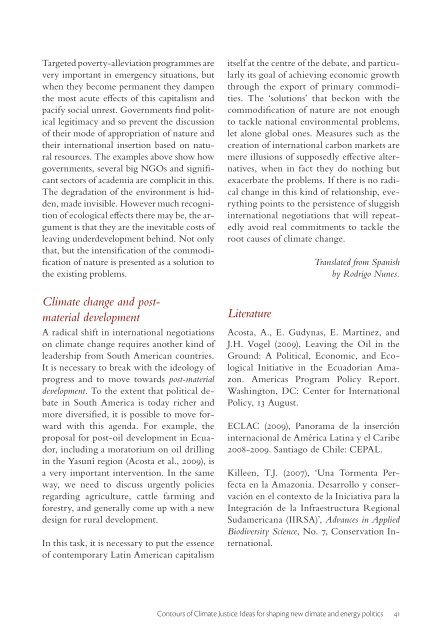Contours of Climate Justice - Dag Hammarskjöld Foundation
Contours of Climate Justice - Dag Hammarskjöld Foundation
Contours of Climate Justice - Dag Hammarskjöld Foundation
Create successful ePaper yourself
Turn your PDF publications into a flip-book with our unique Google optimized e-Paper software.
Targeted poverty-alleviation programmes are<br />
very important in emergency situations, but<br />
when they become permanent they dampen<br />
the most acute eff ects <strong>of</strong> this capitalism and<br />
pacify social unrest. Governments fi nd political<br />
legitimacy and so prevent the discussion<br />
<strong>of</strong> their mode <strong>of</strong> appropriation <strong>of</strong> nature and<br />
their international insertion based on natural<br />
resources. The examples above show how<br />
governments, several big NGOs and signifi -<br />
cant sectors <strong>of</strong> academia are complicit in this.<br />
The degradation <strong>of</strong> the environment is hidden,<br />
made invisible. However much recognition<br />
<strong>of</strong> ecological eff ects there may be, the argument<br />
is that they are the inevitable costs <strong>of</strong><br />
leaving underdevelopment behind. Not only<br />
that, but the intensifi cation <strong>of</strong> the commodifi<br />
cation <strong>of</strong> nature is presented as a solution to<br />
the existing problems.<br />
<strong>Climate</strong> change and postmaterial<br />
development<br />
A radical shift in international negotiations<br />
on climate change requires another kind <strong>of</strong><br />
leadership from South American countries.<br />
It is necessary to break with the ideology <strong>of</strong><br />
progress and to move towards post-material<br />
development. To the extent that political debate<br />
in South America is today richer and<br />
more diversifi ed, it is possible to move forward<br />
with this agenda. For example, the<br />
proposal for post-oil development in Ecuador,<br />
including a moratorium on oil drilling<br />
in the Yasuní region (Acosta et al., 2009), is<br />
a very important intervention. In the same<br />
way, we need to discuss urgently policies<br />
regarding agriculture, cattle farming and<br />
forestry, and generally come up with a new<br />
design for rural development.<br />
In this task, it is necessary to put the essence<br />
<strong>of</strong> contemporary Latin American capitalism<br />
itself at the centre <strong>of</strong> the debate, and particularly<br />
its goal <strong>of</strong> achieving economic growth<br />
through the export <strong>of</strong> primary commodities.<br />
The ‘solutions’ that beckon with the<br />
commodifi cation <strong>of</strong> nature are not enough<br />
to tackle national environmental problems,<br />
let alone global ones. Measures such as the<br />
creation <strong>of</strong> international carbon markets are<br />
mere illusions <strong>of</strong> supposedly eff ective alternatives,<br />
when in fact they do nothing but<br />
exacerbate the problems. If there is no radical<br />
change in this kind <strong>of</strong> relationship, everything<br />
points to the persistence <strong>of</strong> sluggish<br />
international negotiations that will repeatedly<br />
avoid real commitments to tackle the<br />
root causes <strong>of</strong> climate change.<br />
Literature<br />
Translated from Spanish<br />
by Rodrigo Nunes.<br />
Acosta, A., E. Gudynas, E. Martínez, and<br />
J.H. Vogel (2009), Leaving the Oil in the<br />
Ground: A Political, Economic, and Ecological<br />
Initiative in the Ecuadorian Amazon.<br />
Americas Program Policy Report.<br />
Washington, DC: Center for International<br />
Policy, 13 August.<br />
ECLAC (2009), Panorama de la inserción<br />
internacional de América Latina y el Caribe<br />
2008-2009. Santiago de Chile: CEPAL.<br />
Killeen, T.J. (2007), ‘Una Tormenta Perfecta<br />
en la Amazonia. Desarrollo y conservación<br />
en el contexto de la Iniciativa para la<br />
Integración de la Infraestructura Regional<br />
Sudamericana (IIRSA)’, Advances in Applied<br />
Biodiversity Science, No. 7, Conservation International.<br />
<strong>Contours</strong> <strong>of</strong> <strong>Climate</strong> <strong>Justice</strong>. Ideas for shaping new climate and energy politics 41
















